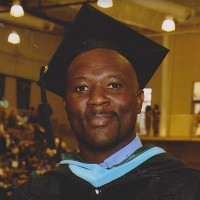(Editor’s note: the following is a condensed version of a talk given to the Gwinnett Rotary Club by a teacher at Berkmar High School. He recently was recognized as the Outstanding Teacher in American History Award by the Philadelphia Winn chapter of the Daughters of the American Revolution in Lawrenceville. He is a graduate of Georgia State with a bachelor’s and master’s degree and lives in Snellville with his wife, Kristi, also a Berkmar teacher, and their son, Lloyd Jr.)-eeb
By Lloyd Williams
SNELLVILLE, Ga. | Do you cherish economic growth? Want to see your real-estate values increase? Do you wish for a better world for your children and grandchildren?
If your answer to any of those questions is yes, then we must have peace, tolerance, and understanding on both the local and global level. I’ve taught high school social studies for nearly two decades. As I try to explain to my students, the past shapes the present. If we understand how we got here, we can be the architects of a better tomorrow.
To see the benefits accrued in the pursuit of tolerance, one need only consider the history of Atlanta. This city was established as a logistical hub for the rapidly expanding railroad network in the mid-19th century. Strong business ties to the rest of the Union facilitated the city’s rapid development after the destruction of war. A string of tolerant leaders made key decisions which placed economic growth over petty hatreds.
In 1919, a racetrack south of the city was converted into a small airfield. This move was spearheaded by Atlanta Mayor William B. Hartsfield. A racial moderate, Hartsfield coined the phrase “the city too busy to hate.” During World War II, he was amenable to Federal funding for expansion of the airfield. Of course, that money had strings attached, strings that required fair and equitable employment opportunities for minorities. Other municipalities rejected those conditions.
But not Hartsfield. During the war, Atlanta became a national aviation hub. And the rest is history.
However, Atlanta hasn’t always lived up to Hartfield’s motto. In 1964 Mayor Allen wanted to host a celebratory dinner to honor Dr. Martin Luther King’s Nobel Peace Prize. It was to be an integrated event. Many of Atlanta’s old guard didn’t want to attend.
This was a problem. By the early 60s Atlanta was pulling ahead of Birmingham for the title of “Queen city of the Southeast.” Many, including the leadership of Coca Cola had high hopes for Atlanta. The leadership of Coca Cola acted. At a gathering Coca Cola’s CEO Chairman Paul Austin presented an ultimatum to the city: “It is embarrassing for Coca-Cola to be located in a city that refuses to honor its Nobel Peace Prize winner. We are an international business. The Coca-Cola Company does not need Atlanta. You all must decide whether Atlanta needs the Coca-Cola Company.”
As a result, the City of Atlanta honored Dr. King with a sit-down, integrated banquet, the first for the city. Again, “the rest is history.”
Speaking of Birmingham: for the first half of the 20th century, the Magic City had the edge over Atlanta. But by the 1960s, figures like Police Chief Eugene “Bull” Connor came to define Birmingham. When given the choice between progress and prosperity, or bigotry and stagnation, Birmingham doubled down on hatred. Meanwhile, Atlanta was spared the drama of the civil rights movement, with many Civil Rights leaders calling Atlanta home, and the most dramatic scenes of the Civil Rights movement took place on the streets of Birmingham. This had consequences. When Delta was looking for a new headquarters, Birmingham was among the candidates passed over in favor of Atlanta.
And again, “the rest is history.”











Follow Us